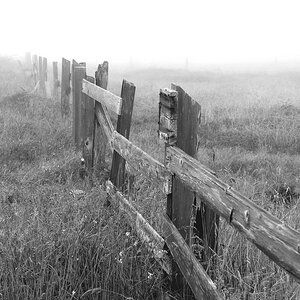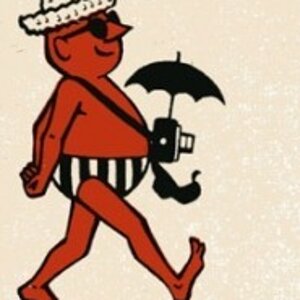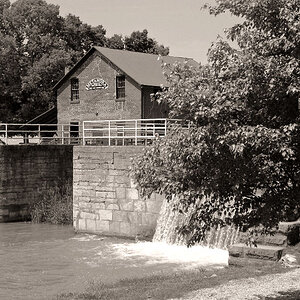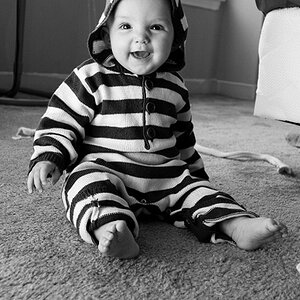epatsellis
TPF Noob!
- Joined
- Apr 15, 2008
- Messages
- 542
- Reaction score
- 23
- Can others edit my Photos
- Photos NOT OK to edit
I'll admit, I've been at this a lot longer than most here have been alive, and come from a traditional studio shooter background. However, a few threads have brought me to the tipping point and I've got to vent. .........
Granted the days of using view cameras for product work are, for the most part, long gone. Yet there are a slew of tools and equipment developed over a century of studio use to make shooting "things" easier. From using a boom to hold a light over a set to studio stands, shooting tables and other studio "furniture".
A lot of the questions I see asked here are indicators of a lack of the most basic skills, threads about the most basic equipment choices'; what lens should I use, grainy images (sic), etc. Threads about basic lighting questions, from equipment choices to how to eliminate reflections.
I can offer some advice from someone who has probably shot more Polaroids in a studio than most here have shot digital images: Before you convince anybody to pay you to shoot for them, learn the basics, understand how aperture, shutter speed and ISO interrelate, understand why shooting at a camera's base ISO is important to image quality. Learn about lighting, buy "Light: Science and Magic" and really study it. Understand white balance, (for example, when shooting under tungsten light you should use a color correction filter, as all DSLR sensors are daylight balanced and shifting white balance will introduce noise, reduce dynamic range and introduce a non linear response in the blue channel. Using an 80 series filter will restore the image to daylight before it reaches the sensor (at a 2 stop penalty...))
Learn, learn, learn. Do what many of us have spent 30+ years doing, and understand photography at an instinctual level. Or as Ansel Adams said (paraphrasing) "Technical proficiency allows creativity". Shoot hundreds of things from around your house, replicate images you see in magazines and ads, shoot til you can look at an image and deconstruct lighting, focal length, etc.
To properly shoot products require some equipment and it costs money. Learning takes a lot of time and effort. If you aren't willing to invest in what it takes to do the job properly, both time and money, please save yourself and your reputation, your client and the "trade" by simply declining. I've seen far too many here that take on a job then scramble to get advice on how to do it. You're doing yourself and your clients a disservice, their living may very well depend on your skills, directly or not. It's a huge responsibility that few appreciate, your images represent everything your client is, from the viewer's perspective, and if you have doubts, you shouldn't be doing it, period. There's a saying in racing, "if you want to play, you've got to pay". And if you want to really be at the top of your game shooting product and commercial work, it's just as valid. If you're serious about shooting product, the price of a used studio stand is incredibly cheap...My 12' Cambo UST with every accessory known to man cost me $400 and a tank of gas. I only needed a 9', and had to cut the column down, but if I'm not mistaken,$400 is a lot less than the latest "carbon fiber, practically makes you a photo god, can't possibly be considered a pro without" wonder tripod that seems to be all the rage these days...no accounting for taste I suppose.
Product and commercial work used to be the pinnacle of the photographic business, you had to have a complete, diverse working knowledge of every aspect of photography, set design and building, lighting, working to a layout, and much more. Today, not so much, apparently. The several commercial shooters I know that are still working (four of which "came into their own"/honed their skills in my studio) all have pretty much the same attitude, as soon as they can retire they will, the cost of maintaining a professionally staffed and equipped studio today is at best marginal, from an economic standpoint. Demand keeps dropping, though considering what I've seen in the market, there's a true lack of imaging skill at a technical level today.
Perhaps I'm a dinosaur, but professionalism, skill and ability to deliver a product of the highest quality (in this case an image) in a timely manner are a rare thing these days. While retired from commercial photography, I still find and excuse here and there to shoot, though only a tiny portion of my income is derived from my commercial shooting anymore. The images I get from clients for use, many of them Fortune 500 companies, are shocking. Blown highlights, noisy shadows, white balance that is anything but, and horrible lighting, seem to be the norm these days.
Probably 5% of the images I see are usable as is, and professionally present the product.
Of course the (insert air quotes here)photographers are only half of the equation, as AD's and CD's see budgets cut, they trim corners where they can and squeeze every vendor along the way. Ever try bargaining with an ad agency, it plain doesn't happen. They charge what they charge and that's that. (and if you thing lawyers are expensive....) Yet everybody that supplies them is expected to toe the line, every time you hear "then next job will be for more money", your being lied to...Run away, fast....Really, really fast. By working for a photo credit, you've established your price with that client, you'll never get that "next job", I'll put money on that. And, you've unknowingly told the client what you fell your work is worth...think about that for a moment and the reason you're more likely to find a rainbow farting unicorn in your garage tomorrow morning than that mythical "next job" should be obvious. I do a lot of pro bono work, but I approach the company or charity and offer my services, not the other way around, without any the attendant expectations that go with it.
I'll stop ranting now, and welcome other's opinions openly.
erie
Granted the days of using view cameras for product work are, for the most part, long gone. Yet there are a slew of tools and equipment developed over a century of studio use to make shooting "things" easier. From using a boom to hold a light over a set to studio stands, shooting tables and other studio "furniture".
A lot of the questions I see asked here are indicators of a lack of the most basic skills, threads about the most basic equipment choices'; what lens should I use, grainy images (sic), etc. Threads about basic lighting questions, from equipment choices to how to eliminate reflections.
I can offer some advice from someone who has probably shot more Polaroids in a studio than most here have shot digital images: Before you convince anybody to pay you to shoot for them, learn the basics, understand how aperture, shutter speed and ISO interrelate, understand why shooting at a camera's base ISO is important to image quality. Learn about lighting, buy "Light: Science and Magic" and really study it. Understand white balance, (for example, when shooting under tungsten light you should use a color correction filter, as all DSLR sensors are daylight balanced and shifting white balance will introduce noise, reduce dynamic range and introduce a non linear response in the blue channel. Using an 80 series filter will restore the image to daylight before it reaches the sensor (at a 2 stop penalty...))
Learn, learn, learn. Do what many of us have spent 30+ years doing, and understand photography at an instinctual level. Or as Ansel Adams said (paraphrasing) "Technical proficiency allows creativity". Shoot hundreds of things from around your house, replicate images you see in magazines and ads, shoot til you can look at an image and deconstruct lighting, focal length, etc.
To properly shoot products require some equipment and it costs money. Learning takes a lot of time and effort. If you aren't willing to invest in what it takes to do the job properly, both time and money, please save yourself and your reputation, your client and the "trade" by simply declining. I've seen far too many here that take on a job then scramble to get advice on how to do it. You're doing yourself and your clients a disservice, their living may very well depend on your skills, directly or not. It's a huge responsibility that few appreciate, your images represent everything your client is, from the viewer's perspective, and if you have doubts, you shouldn't be doing it, period. There's a saying in racing, "if you want to play, you've got to pay". And if you want to really be at the top of your game shooting product and commercial work, it's just as valid. If you're serious about shooting product, the price of a used studio stand is incredibly cheap...My 12' Cambo UST with every accessory known to man cost me $400 and a tank of gas. I only needed a 9', and had to cut the column down, but if I'm not mistaken,$400 is a lot less than the latest "carbon fiber, practically makes you a photo god, can't possibly be considered a pro without" wonder tripod that seems to be all the rage these days...no accounting for taste I suppose.
Product and commercial work used to be the pinnacle of the photographic business, you had to have a complete, diverse working knowledge of every aspect of photography, set design and building, lighting, working to a layout, and much more. Today, not so much, apparently. The several commercial shooters I know that are still working (four of which "came into their own"/honed their skills in my studio) all have pretty much the same attitude, as soon as they can retire they will, the cost of maintaining a professionally staffed and equipped studio today is at best marginal, from an economic standpoint. Demand keeps dropping, though considering what I've seen in the market, there's a true lack of imaging skill at a technical level today.
Perhaps I'm a dinosaur, but professionalism, skill and ability to deliver a product of the highest quality (in this case an image) in a timely manner are a rare thing these days. While retired from commercial photography, I still find and excuse here and there to shoot, though only a tiny portion of my income is derived from my commercial shooting anymore. The images I get from clients for use, many of them Fortune 500 companies, are shocking. Blown highlights, noisy shadows, white balance that is anything but, and horrible lighting, seem to be the norm these days.
Probably 5% of the images I see are usable as is, and professionally present the product.
Of course the (insert air quotes here)photographers are only half of the equation, as AD's and CD's see budgets cut, they trim corners where they can and squeeze every vendor along the way. Ever try bargaining with an ad agency, it plain doesn't happen. They charge what they charge and that's that. (and if you thing lawyers are expensive....) Yet everybody that supplies them is expected to toe the line, every time you hear "then next job will be for more money", your being lied to...Run away, fast....Really, really fast. By working for a photo credit, you've established your price with that client, you'll never get that "next job", I'll put money on that. And, you've unknowingly told the client what you fell your work is worth...think about that for a moment and the reason you're more likely to find a rainbow farting unicorn in your garage tomorrow morning than that mythical "next job" should be obvious. I do a lot of pro bono work, but I approach the company or charity and offer my services, not the other way around, without any the attendant expectations that go with it.
I'll stop ranting now, and welcome other's opinions openly.
erie













